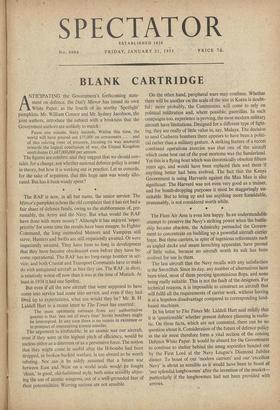BLANK CARTRIDGE
NTICIPATING the Government's forthcoming state- ment on defence, the Daily Mirror has issued its own White Paper, as the fourth of its worthy `Spotlight' pamphlets. Mr. William Connor and Mr. Sydney Jacobson, the joint authors, introduce the subject with a briskness that the Government authors are unlikely to match : Pause one minute. Sixty seconds. Within this time, the' world will have poured out £55,000 on armaments . . . and of this roaring river of treasure, foaming its way seawards towards the logical conclusion of war, the United Kingdom contributes f 1,687,000,000 per annum. , The figures are sombre; and they suggest that we should con-.
sider, for a change, not whether national defence policy is sound in theory, but how it is working out in practice. Let us concede, for the sake of argument, that this huge sum was wisely allo- cated. But has it been wisely spent?
•
The RAF is now, in all but name, the senior service. The Mirror's pamphlet echoes the old complaint that it has not had a fair share of defence funds, owing to the stubbornness of, pre- sumably, the Army and the Navy. But what would the RAF have done with more money? Although it has enjoyed 'super- priority' for some time the results have been meagre. In Fighter Command, the long outmoded Meteors and Vampires still serve; Hunters and Swifts are still impatiently awaited. Or were impatiently awaited. They have been so long in development that they have become obsolescent even before they have be- come operational. The. RAF has no long-range bomber in ser- vice; and both Coastal and Transport Commands have to make do with antiquated aircraft as best they can. The RAF, in short, is relatively worse off now than it was at the time of Munich. At least in 1938 it had one Spitfire.
But even if all the new aircraft that were supposed to have come into service had come into service, and even if they had lived up to expectations, what use would they be? Mr. B. H.
Liddell Hart in a recent letter to The Times has asserted :
• The most optimistic estimate from any authoritative quarter is that 'one out of every four' Soviet bombers might be intercepted. In any case there is no means in existence or in prospect of intercepting atomic missiles.
The argument is irrefutable; in an atomic war our aircraft, even if they were at the highest pitch of efficiency, would be useless either as a deterrent or as a preventive force. The notion that they might come in useful after the H-bombs had been dropped. in broken-backed warfare, is too absurd .to be worth refuting. Nor can it be safely assumed that a future war between East and West on a world scale would be fought `clean,' in good, old-fashioned style, both sides sensibly abjur- ing the use of atomic weapons, out of a well-grounded fear of their potentialities. Warring nations are not sensible. On the other hand, peripheral wars may continue. Whether there will be another on the scale of the war in Korea is doubt- ful: more probably, the Communists will come to rely on political infiltration and, where possible, guerrillas. In such campaigns too, experience is proving, the most modern military aircraft have limitations. Designed for a different type of fight- ing, they are really of little value in, say, Malaya. The decision to send Canberra bombers there appears to have been a politi- cal rather than a military gesture. A striking feature of a recent combined operations exercise was that one of the aircraft which came best out of the post mortems was the Sunderland. Yet this is a flying boat which was theoretically obsolete fifteen years ago, and would have been replaced then and there if anything better had been evolved. The fact that the Kenya Government is using Harvards against the Mau Mau is also significant. The Harvard was not even very good as a trainer, and for bomb-dropping purposes it must be staggeringly un- suitable. But to bring up and use anything more formidable, presumably, is not considered worth while.
S • • The Fleet Air Arm is even less happy. In an understandable attempt to preserve the Navy's striking power when the battle- ship became obsolete, the Admiralty persuaded the Govern- ment to concentrate on building up a powerful aircraft carrier force. But these carriers, in spite of ingenious refinements such as angled decks and steam launching apparatus, have proved of little value, because no aircraft worth its salt has been evolved for use in them.
The last aircraft that the Navy recalls with any satisfaction is the Swordfish. Since its day, any number of alternatives have been tried, most of them proving ignominious flops, and none being really suitable. This is not the fault of the designers. For technical reasons, it is impossible to construct an aircraft that will fulfil all the requirements or carrier work, without leaving it at a hopeless disadvantage compared to corresponding land- based machines.
In, his letter to The Times Mr. Liddell Hart said mildly that it is 'questionable' whether present defence planning is realis- tic. On these facts, which are not contested, there can be no question about it. Consideration of the future of defence policy in the air must therefore form a vital section of the coming Defence White Paper. It would be absurd for the Government to continue to shelter behind the smug soporifics handed out by the First Lord at the Navy League's Diamond Jubilee dinner. To boast of our 'modern carriers' and our 'excellent Navy' is about as sensible as it would have been to boast of `our splendid longbowmen' after the invention of the musket— particularly if the longbowmen had not been provided with' arrows.


































 Previous page
Previous page